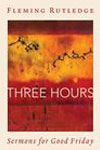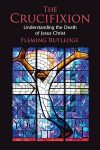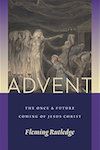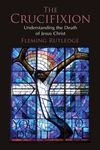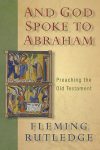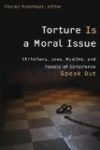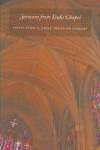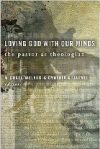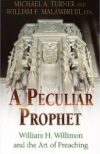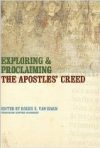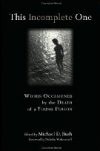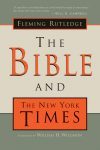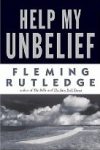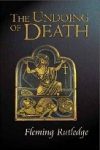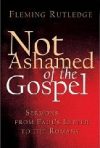By Fleming Rutledge February 6, 2004
I have two topics on my mind that I propose to disclose gradually rather than announce them at the beginning. The two are related to one another. I propose to divide this presentation into two parts, pausing in the middle for some discussion. I understand that I am inside the Beltway here, and in a presidential election year at that; therefore I know that everything I say will be in a political context. I am certainly capable of making a politically partisan speech, but as a preacher of the gospel I do not do that. I did not do it last Advent when I preached at the National Cathedral on the eve of the Iraq war, and I am not going to do it now. What I do intend to do is raise questions that all American Christians should be thinking about in these dangerous times. I am also aware that I am speaking in the midst of a volatile situation in our Episcopal Church. I hope that when I am finished you will see that I have addressed that situation, but indirectly, by focusing on something else that I think is even more important that the issue that divides us at present. I have extensive files on my two topics and I am adding to them all the time. A recent addition is a review of a new book called In the Land of Magic Soldiers. The title refers to the widespread belief in the sub-Saharan African countries that there are certain magic rituals, going even to the extreme of cannibalism, that will guarantee immunity to bullets, hence, “magic soldiers”. The book is about the gruesome civil war in Sierra Leone. The section of the review that caught my attention begins, “What is of value in this book is less what it says about Sierra Leone than about the human condition.” I am always interested in what people are writing about the human condition. The review discusses “the most haunting figure” in the book, a white South African mercenary who flies a combat helicopter for the Sierra Leone government, indeed the only one that the government owns. This white man from South Africa says that the thrill of machine-gunning people on the ground from the air is “better than sex…There’s a lot of adrenaline going. You’re all keyed up, and when you realize you’re on target, that you’ve taken out the enemy, that’s a great feeling.” This same man pays for schooling for local children out of his own pocket and plans to start a local burn center because there isn’t one anywhere in Sierra Leone. The reviewer observes that this man “is so memorable because the strange blend of killing and healing in his life is a reminder of how precarious is the balance between them, and of how easily it can be tipped one way or the other by the societies we build for ourselves.”1 Another recent article in The New York Times features an interview with Dr. Allen Keller, the kind and self-sacrificing director of the Bellevue/NYU Program for Survivors of Torture. The interviewer is clearly appalled by the ghastly stories that Dr. Keller tells him about his patients. The doctor says, “How could people do such things? I’m scared that it’s easier than we think.” That is in part why he opposes torture to extract information from terrorists. “We mustn’t go there, It cheapens who we are.”2 Clearly this doctor who ministers to victims is aware that our propensity for harming others is closer to the surface than we like to think.
I am not afraid of the general’s fire. There is no greatness about them; lies and force are their weapons…
I am sure that we shall win…we shall leave the prisons and come out of the underground onto the bright square of freedom.
But what will we be like then? I am afraid not of what they will do to us, but of what they can make us into….I pray that we do not change from prisoners into prison guards.3
I have collected these thoughts, and dozens of others like them, into a file which has become my constant companion in recent months. I am offering some of them now in the context of the movie that a lot of people think is going to win the Oscar─The Lord of the Rings. I am not a fan of the movie but I am a lover of the book, and indeed I have a book on the subject myself coming out some time this spring, a book called The Battle for Middle-earth. The title is significant because I wanted to convey the sense of a great conflict. Because of the movie, this conflict is now being widely misinterpreted as a clear-cut battle between Good and Evil. The Danish-American actor who plays Aragorn in the movie, Viggo Mortensen, has been campaigning against this misunderstanding. Here is some of what he wrote in the illustrated guide to the second movie in the series:
The second installment of The Lord of the Rings comes to theatres in a world that is no more secure than the one in which the first was released last year…It would seem from even a cursory reading of world history that there is no new horror under the sun, that we will perhaps always have to contend with destructive impulses in ourselves and others…The most enlightened beings in Middle-Earth are conscious of the ubiquity of good and evil in neighbors, strangers, adversaries, and most important, themselves. ]4
Everywhere I go I hear people talking about the Lord of the Rings movie as a battle of Good vs. Evil. This would have displeased the author, J. R. R. Tolkien, a great deal. He made it very clear in his many letters that he did not mean it to be interpreted that way. All of his characters are vulnerable to the power of evil. Not even Gandalf, the archangel figure, is immune; some of Tolkien’s angels (the Valar) and Elves were themselves responsible for all the evil that had come into Middle-earth. All of this mythology is based on the Christian tradition, suggested in the book of Isaiah, that the angel Lucifer had rebelled against God. In Tolkien’s letters, he often put quotation marks around the word “good” as if to say, this person that thinks he’s so good may not be so good after all. One of the most challenging things about growing into Christian maturity is learning and acknowledging one’s own faults and weaknesses. When we have done this, we are not so quick to assign others to the category of “bad” or “evil.” In Shakespeare’s play, All’s Well That Ends Well, two young noblemen are discussing the mixed motives of the characters around them. One says to the other, “The web of our life is of a mingled yarn, good and ill together.” I was at a dinner party the other night consisting of some exceptionally intelligent people, some of whom were political conservatives and some liberals. The conservatives kept talking about “evil.” One of the liberals burst out, “I don’t believe in evil!” The others looked at him in shock. I was shocked too, at first, but something told me he hadn’t meant it quite the way it sounded. Upon being questioned further he admitted that he didn’t mean to say there was no such thing as evil. What he didn’t agree with was the way the others were talking so readily about who was evil and who was not. The reason that Europeans look askance at Americans when we talk about evil is not that they don’t know evil when they see it. It’s that we Americans love to think of ourselves as innocent and good. (Graham Greene’s cynical journalist in The Quiet American is typical here: “God save us always from the innocent and the good”5) We feel injured when other countries don’t like us. I encountered anti-Americanism for the first time on my first trip to Europe when I went out on a date with a Dutch boy. I have never forgotten how wounded I felt when I learned that there were people who thought American intentions were malign. I took it personally. We Americans are used to thinking of ourselves as supremely well-intentioned, so we are outdone when others don’t see us that way. Polls are regularly released about the religious beliefs of Americans. A majority of Americans, especially in the “red” states that voted Republican in 2000, believe in heaven and hell. Of these, close to 90% percent believe that they themselves are going to heaven. An equal percent think they know someone else who is going to hell. This should not surprise us. Twenty-two years of parish ministry showed me that most people consider themselves entitled to judge the motives and actions of others in a negative way while giving themselves a pass. If we read the Psalms regularly, as all Christians should, we will readily come up against a contradiction. Many of the Psalms contain passages in which the speaker declares a distinction between the righteous and the wicked. For example, Psalm 1:
Therefore the wicked will not stand in the judgment, nor sinners in the congregation of the righteous; for the Lord knows the way of the righteous, but the way of the wicked will perish. (Psalm 1:5-6)
When I started looking through the Psalms for examples of this, though, I got a surprise. I was expecting to find many Psalms where the speaker (singer) calls himself righteous and the other person wicked. But there were far fewer examples of this than I thought. Even in the Psalms where the speaker prays for terrible things to happen to his enemies, the imprecations are always provisional. The general sense is, “God, this is the way I feel about these wicked people, I’d like you to bash their children’s heads against the wall, but I realize it’s up to you, not me, to make these judgments.” It’s as if the speaker is hoping that he is one of the righteous but isn’t quite sure; there is always a proviso that only God can determine and only God can punish. Throughout the Psalms the words of the singers seem to indicate that no matter how bitterly angry they may be at the “wicked,” they are never─in the final analysis─exempting themselves as if they were beyond judgment. In any case, the imprecatory Psalms are balanced by those written (and sung) in the voice of a worshipper who knows himself to be a sinner before God, no better than anyone else, and unable to save himself by himself.
Remember not the sins of my youth, or my transgressions; according to thy steadfast love remember me, for thy goodness’ sake, O Lord!…. For thy name’s sake, O Lord, pardon my guilt, for it is great. (Psalm 25:7, 11) Day and night thy hand was heavy upon me; my strength was dried up as by the heat of summer. I acknowledged my sin to thee, and I did not hide my iniquity; I said, “I will confess my transgressions to the Lord”; then thou didst forgive the guilt of my sin. [Psalm 32] O Lord, rebuke me not in thy anger, nor chasten me in thy wrath! For thy arrows have sunk into me, and thy hand has come down on me. There is no soundness in my flesh because of thy indignation; there is no health in my bones because of my sin. For my iniquities have gone over my head; they weigh like a burden too heavy for me. (Psalm 38)
Those of us who are over sixty will remember how we used to say “there is no health in us” in the General Confession. That last Psalm is one of the sources for that declaration:
There is no soundness in my flesh… there is no health in my bones because of my sin.
The point of all this is to show how the line that the Bible draws between the “bad guys” and the “good guys” is not as sharp as we think it is. Jesus makes a great many statements about what will happen to the unrighteous, but he almost always makes these statements to those who think they are the righteous, especially when he perceives that they were congratulating themselves on being better than others. There is much wisdom about this in the book of Proverbs:
All the ways of a man are pure in his own eyes, but the Lord weighs the spirit…Pride goes before destruction, and a haughty spirit before a fall. It is better to be of a lowly spirit with the poor than to divide the spoil with the proud (Proverbs 16:2, 18-19). There are those who are pure in their own eyes but are not cleansed of their filth. (Proverbs 30:12)
At last year’s Academy Awards you will remember that two major Oscars were given to The Pianist. A whole new marketing strategy was promptly rolled out to pull in a new audience. From the new ads, you would never have known it was a movie about the Holocaust. The illustration looked like My Big Fat Greek Wedding─it shows a happy, smiling family raising glasses and toasting one another. OK, fair enough, maybe that would attract more people to see the film. But the new pitch─and here’s my point─ was “Experience the Triumph of the Human Spirit.” Those of you who have already seen this superb movie will know that it is not in the least about the triumph of the human spirit. It is about human beings exhibiting extremes of wickedness and goodness often within the same person. It is about the way that enormous evil takes over people in wartime so that so-called “good” people often do shameful things and seemingly “evil” people occasionally do good things. It is about the pressure of forces spinning out of control, causing people who were friends or neighbors or even blood relatives to turn against one another because of the moral chaos and loss of context that occurs when evil runs rampant, and who─ who?─can say what he or she would have done under those circumstances? So this evening I am placing the emphasis on the predicament that you and I share, every single one of us in this room. Evil lies close at hand. Who said that? Well, actually, it was St. Paul. I find it to be a law that when I want to do right, evil lies close at hand. And he continues: I do not understand my own actions. For I do not do what I want, but I do the very thing I hate…I can will what is right, but I cannot do it. For I do not do the good I want, but the evil I do not want is what I do. Now if I do what I do not want, it is no longer I that do it, but sin which dwells within me (Romans 7:15-20). Is there anyone here tonight who does not recognize this? Many church members today who do not know much about the Bible have been led to think that Jesus was loving, embracing, inclusive and so forth whereas St. Paul was harsh and punitive and enjoyed excluding people. This is a very serious misunderstanding of Paul’s relationship to the witness of the four Gospels. If we had only the four Gospels we would not have fully understood the radicality of the new society that our Lord was creating when he sat at table with those who were considered notorious sinners. Paul is the one who spelled it out for us. It is Paul who says In Christ Jesus you are all sons [children] of God, through faith. For all who were baptized into Christ have put on Christ. There is neither Jew nor Greek, there is neither slave nor free, there is neither male nor female; for you are all one in Christ Jesus (Galatians 3:26-28). It is Paul who said For by one Spirit we were all baptized into one body—Jews or Greeks, slaves or free—and all were made to drink of one Spirit. (I Corinthians 12:13) Above all it is Paul who wrote Romans 9-11 which gives us the most comprehensive vision of salvation across boundaries that we have in the entire Bible. So it is crucially important to understand how the Epistles─those by Paul and those by others─interpret the theological consequences of the stories that are told in the four Gospels. I have been in conversation with the religion editor of Time magazine. He is doing a story for Time about the Crucifixion, slated to appear on Ash Wednesday when the Mel Gibson movie is finally released. The religion editor is Jewish and knows very little about Christian faith, though I found him eager to learn. The thing that I tried to stress in our conversations is that what’s missing from all the movies about Jesus is the apostolic preaching, that is, the post-Easter preaching. The movies tell the story of what happened, or what the Gospel writers say happened, but they can’t tell us very much about why it happened or what it meant unless they include some of the apostolic preaching, which they never do. (Of course the apostolic preaching shaped the Gospels, but that is more implicit than explicit. The Epistles are wholly explicit in their teaching.) St. Paul is the one who fought for the inclusion of the Gentiles in the gospel, and by extension the inclusion of anyone who lay outside the boundaries of what was considered righteous and godly. That is why he wrote in Romans 5 that Christ died for the ungodly. The most radical of Paul’s equalizing, inclusive statements, are in Romans. For instance:
All human beings, both Jews and Greeks [godly and ungodly], are under the power of sin; as it is written: “None is righteous, no, not one…All have turned aside, together they have gone wrong;…There is no fear of God before their eyes. (Romans 3:9-18) You may be turned off by this, but just wait. The next one is the most radical of all. It is from Romans 11:
God has consigned all men to disobedience in order that he may have mercy upon all. (Romans 11:32) I would argue that this is the most inclusive verse in all of Scripture, yet many resist it, partly because it seems to put all the responsibility on God, and partly because the typical human being does not like to think of himself as “consigned to disobedience.” Yet only yesterday I saw a big feature story in the Norfolk paper about all the people who are feeling guilty because it’s only February and they have already broken their New Year’s resolutions. Consigned to disobedience! Have you taken a look at the Ten Commandments lately? If you are honest about yourself in relation to them, you will understand that if you were left to yourself you are consigned to disobedience. The General Confession of the church is meant to embody these truths about the human condition. We say it all together without any distinctions being made among us. “We have left undone those things which we ought to have done, and we have done those things which we ought not to have done…we have followed too much the devices and desires of our own hearts…and there is no health in us.” Last weekend I talked with a woman who is a chaplain on Death Row in a Virginia prison. When she is with a prisoner and they say the confession, there is no distinction between them. I wonder if you caught that quotation from Scripture as it went by. From Romans 3: There is no distinction; all have sinned and fall short of the glory of God (3:22-3). One sign of a true Christian, and a true Christian society, is a recognition of this truth. Humility and repentance are therefore hallmarks of our faith, because they are based in the knowledge that the entire human race without distinction is imprisoned by disobedience until God has mercy on us. The Church’s role is to take on this repentance and this humility for those who will not do it for themselves. That is what we do on Ash Wednesday. As the first Epistle of Peter says, The time has come for judgment to begin with the household of God (I Peter 4:17). I worry about American arrogance. Our two greatest Presidents understood something about the need for collective repentance before the divine judgment. George Washington and Abraham Lincoln both called America to repentance. It is hard to imagine any President doing that today. It is strange that in the controversy about President Bush’s overt references to God, no one has mentioned Lincoln. Lincoln was a theologian profound enough to stand alongside the giants of Christian history. I am quite serious about that. A recent book discussing his theology is an examination of the Second Inaugural called Lincoln’s Greatest Speech, which I urgently recommend to you. It is well known that Lincoln changed his mind about slavery. This shift on his part has often been negatively construed by Southerners as an insincere political move, but his writings do not support that conclusion. Lincoln wrestled long and hard with theological questions raised in his mind by slavery and the Civil War. He thought deeply about the South and the North before God. Lincoln never spoke of “evildoers” or “the evil ones.” Slavery was a great wrong, he came gradually to understand, but he did not cut up the nation neatly into good and evil with the Union on the good side and the Confederacy on the evil side. In this respect he was profoundly biblical in his understanding. He had read and pondered the Psalms and prophets. For example, when the Lord spoke to the prophet Isaiah saying, Destruction is decreed (Isaiah 10:22), he did not mean that he was going to destroy the bad guys. He meant that he was going to chasten his own people, the people of Israel. I will be developing these themes and quoting further from Lincoln on Sunday morning. Paul writes further in Romans 5: Sin came into the world through one person and death through sin, and so death spread to all humanity because all humans sinned (5:12). This is repeated in I Corinthians 15:22: In Adam all die. Human solidarity in bondage to the power of sin is one of the most important of all concepts for Christians to grasp. This doctrine of original sin, as it’s called, is unique to Christianity. Likewise unique therefore is the meaning of the Crucifixion. In the Cross we see the Son of God taking into himself the entire force and power of Sin. This is what the Mel Gibson movie will never be able to teach, no matter what its merits and demerits may be. The Cross is radically equalizing in a way that we have not always fully appropriated. The distinctions between human beings and groups of human beings that we are accustomed to making are invalid in the sight of God. This is what Paul knew and what Paul preached; this is what the apostles proclaimed throughout the Mediterranean world, giving up their lives for the sake of the gospel. What exactly is the gospel? I will say a few things about that after a break….
(Note: Because of time constraints, portions of this second section were omitted in oral delivery.) Part one of this address had to do with the subject of good and evil, righteousness and sinfulness, godliness and ungodliness─and how the line between them runs through each person. The classic theological term for this is simul peccator et iustus (sinner and saint simultaneously). The second subject is the doctrine of the Word of God in our present situation. I don’t need to tell you that the Episcopal Church is in turmoil. I want to look briefly at the mainline churches in general. That’s the Lutherans, the Presbyterians, the Methodists, the Episcopalians, and the United Church of Christ. These American denominations in direct descent from the Reformation are being challenged as never before in our history. Weekly if not daily, it seems, a new article declares that the mainlines are “losing ground” or are “in decline,” if not “collapsing” or “imploding” or “in free fall.” At the same time, the denominations themselves are splitting along lines described as “liberals” vs. “conservatives,” “revisionists” vs. “traditionalists.” Perceptive observers of the American scene emphasize the chasm between the intellectual and media elite, on the one hand, and the huge, politically influential “Christian Right” on the other. The mainlines are barely holding their traditional center. Although many individual congregations are actually thriving, the overall statistics and projections for the traditional Protestant churches are dire. With all due respect to those who might think me presumptuous, I think I know what the problem is, and I don’t think it’s the homosexuality issue. Speaking as one who has traveled extensively through the mainline churches and listened to hundreds of sermons over a number of years, I believe that the essential problem can be precisely identified in just a few words, and they are the words of our Lord himself as he spoke to a group of Sadducees: Is not this why you are wrong, that you know neither the scriptures nor the power of God? Jesus’ point against the Sadducees is that the power of God is able to create an entirely new reality that transcends all human categories. The link between the two─the Scriptures and the power of God─ is the key. The power of God is manifest through his Word. This is the power that called the creation into being, it is the force that created the Church in the first place, it is the engine that drove the Reformation─ yet this power today is increasingly less heard from mainline pulpits, either as thunder or as still small voice, for we have largely ceased to believe that God speaks. All the symptoms arise from that cause. That is the underlying ailment that is producing the morbid effects. Flannery O’Connor, patron saint of those who care about language and Christian doctrine, wrote to a friend: One of the effects of modern liberal Protestantism has been gradually to turn religion into…therapy, to make truth vaguer and vaguer and more and more relative, to banish intellectual distinctions, to depend on feeling instead of thought, and gradually to come to believe that God has no power, that he cannot communicate with us, cannot reveal himself to us, indeed has not done so and that religion is our own sweet invention.6 We have gradually come to believe that God has no power and has not revealed himself to us. That, I think, is exactly what has happened. The current emphasis on “spirituality” puts the focus on us and our religious activities, rather than on God. It is anthropological rather than theological. Underlying all of this is the question of power, of dunamis. The idea that the Word of God is powerful in and of itself has been fading in the mainlines for a long time. I am reminded of a characteristic locution in the African-American churches. A church member will say, “Who is going to bring the message today?” or, “Thank you, Reverend, for bringing the message.” We don’t say that in the mainlines. We say, “Who’s preaching today?” or “Thank you for the sermon.” The idea of a message coming with its own power seems to lie outside our set of convictions; yet the entire biblical story is founded on that reality, and without it, the essential meaning of biblical revelation is lost. Take for example the characteristic self-introduction of Elijah the prophet: Now Elijah the Tishbite, of Tishbe in Gilead, said to Ahab, “As the Lord the God of Israel lives, before whom I stand, there shall be neither dew nor rain these years, except by my word.” And the word of the Lord came to him. (I Kings 17:1-2) This resounding declaration sets forth some fundamental presuppositions of biblical faith:
It is quite possible to be flexible on the issue of homosexuality without relinquishing these foundational beliefs. What worries me is that Episcopalians are going to take this or that position on that particular issue without addressing the more basic problem: How do we go about reclaiming the Church’s confidence in the living God who speaks and acts? How are we clergy to make this God known to our people if we are not convicted ourselves? How are we to shake off our timidity before the culture and its apparent imperatives? If the trumpet gives an uncertain sound, who shall prepare herself for the battle? (I Corinthians 14:8) The vitality of the churches will come in the present as it came in the past, through the power of the Word itself─the reinvigorating, recreating and revolutionary dunamis of the Holy Spirit, enlivening and interpreting the message. In Romans 10:14-17 Paul speaks of the preaching of the gospel: But how are they to call upon him in whom they have not believed? And how are they to believe in him of whom they have never heard? And how are they to hear without a preacher [better translated as “one heralding” or “one announcing”─the root is kerygma]? And how can people preach unless they are sent? As it is written, “How beautiful are the feet of the ones who announce [the root is evangel] good things!”…So then faith comes from the message, and the message is through the word of Christ. (NEB)7 Paul is saying that the power in Christian proclamation is God’s message itself. The emphasis is not on the human hearing, but on God’s revelatory and performative word. The action is God’s, not ours. This is the message, the evangel, understood as victorious power, the power that removes human “spiritual” capacity to the margins altogether, so that God says (in Isaiah), “I have been found by those who did not seek me; I have shown myself to those who did not ask for me.” As if to underline his meaning, Paul quotes from this paradoxical Isaianic passage in order to show that the Word of God is able to penetrate even the will that is set against God. The emphasis is on the message as invading, victorious power. As Paul reminded the Thessalonians, “Our gospel came to you not only in word, but also in power and in the Holy Spirit and with full conviction” (I Thessalonians 1:5).8 The difference between ordinary messages and the Christian gospel is that the gospel is unconditional. It does not stand back and wait to see how the human being will respond. It is an announcement that creates its own conditions. The kerygma makes something happen. It does not ask for something to happen, it does not suggest that something happen, it does not question whether something might happen if the congregation cooperates. Rather, in the very words themselves, it is already happening. In this second portion of my address I am therefore arguing two things: First, we need a renewed confidence in the Scriptures and the power of God. Another way of saying this is that we need to recover the theology of the Word of God. This means that the training of clergy in seminaries for preaching and the training of congregations in parishes for participating needs to be overhauled. There was a time when great preachers were not uncommon in the Anglican Communion. Indeed, a candidate for greatest preacher ever in the English language is John Donne, 17th century dean of St. Paul’s in London. This supremacy is no longer the case. The Episcopal seminaries barely teach preaching at all, and the lay people do not raise a single protest. The doctrine of the Word of God is barely taught, partly because it is associated with the Reformation, and the Episcopal Church does not want to be Protestant any longer. This move has been accepted with astonishing passivity by the congregations, which I must admit I find difficult to understand. When we lose our confidence in the power of the Word of God to bring a new reality into being, we have fallen back on our sinful selves and our flawed and distorted “spirituality.” And so I am arguing also that, Second: We need a stronger theological basis for inclusivity than we have at present. The underlying reason that ECUSA is in danger of splitting is not that people disagree about homosexuality. The reason is that a strong minority (yes, granted, a minority, but with strength disproportionate to its numbers) of Episcopalians are beginning to recognize─however inchoate their understanding may be─that the theological foundation of the new teaching about sexuality is insufficient, and that the Scriptures are not being interpreted with the sort of reverent searching that believers would like to see from their leaders. Many of our distressed church members are beginning to fall back on the labels “liberal” and “conservative.” This is unfortunate. Perhaps it is too late to reclaim the word “liberal,” but its connotations surely belong to the spirit of the Christian gospel: generous, open-handed, free, spacious, abundant, bountiful. How can “conservative” compete with that? It sounds narrow, pinched, fearful, retrograde─and for that very reason many Christians who stand on the Scriptures and the Creeds refuse the term.9 Theological liberalism in the mainlines today, however, is open to serious criticism because of its sentimental insufficiency. To give just one of many possible examples, the slogan of the Episcopal Church during the nineties was, “No outcasts.” This sounded wonderful; who could object to it? Surely this is in the spirit of Jesus who made a special point of befriending outcasts. But because the slogan lacked theological grounding and was never connected to the full biblical story─which does after all have something to say about the universal reign of sin and judgment for all parties─it was by default associated with the specific administration of one Presiding Bishop. The “conservatives” in the denomination soon began to feel, with some justification, that they were the new outcasts. The slogan, in other words, lost its connection to the story of God and became an identifying tag for a particular kind of human project with all the prejudices that necessarily accrue to such ventures. The foundation for inclusivity was not strong enough or broad enough to include those who were, rightly or wrongly, labeled as evangelicals, conservatives or (worst) fundamentalists. By the same token, of course, the litmus tests administered by the conservatives for full status within their assemblies have left various people feeling marginalized as well. No matter how “Christ-centered” and “Bible-believing” (to use some of the code words) those persons might be, there was no room for them if they did not toe the line on such matters as abortion, stem-cell research and homosexuality. Many sincere evangelically-minded clergy have known the pain of being declared “not sound.” Speaking generally of church life today, neither on the right nor on the left have we seen a truly radical understanding of what the gospel declares to be true about our status before God and one another. The doctrine of justification by grace through faith alone is given much lip service, but the reality on the ground seems to be justification by right doctrine, whether it be a narrowly conceived biblicism on the right or a set of politically correct dogmas on the left. These polarizations have become so predominant in mainline church life that it is difficult to point to exceptions. Many congregations claim to be largely free of conflict, but that is usually for one of two reasons: 1) those who disagree have gone elsewhere; or 2) the difficult issues─homosexuality in particular─are being studiously ignored. Our urgent need, I would therefore argue, is a serious and intentional theological examination of the question, “On what basis can we be truly liberal?” I was much struck by the recent testimony of Andrew Young, whose liberal political credentials are beyond question. In a wide-ranging interview he spoke of his concerns for the world we are bequeathing to his grandchildren, “the confusion we’re creating in the global order.” He is described as the most popular Democrat in the state of Georgia, black or white, but even so, he is intensely disliked by Georgia Republicans, and remains the butt of hateful racist jokes. Yet he said this about his days in Congress: “Almost everything I tried to do in Congress I was able to do because I worked both sides of the aisle. Conservatives were always in the prayer groups, and I attended. Every Wednesday morning, we had Bible study. Almost everybody there was an extreme conservative. But they saw me as sincere, and I could also share their religious conviction─but give it a little different twist.”10 We should not romanticize or idealize African-American Christians, but as the spirit of the black church has led the way for us before, it might do so again. Andrew Young’s model is one that the liberal mainlines might ponder. In the black church there is a tradition of forgiveness and tolerance, a faith in the power of redemption for every person, which perseveres in spite of endless slights and hurts. At the same time there is among many African-American Christians a mighty faith in the living God whose Word is like a hammer that breaks the rock in pieces (Jeremiah 23:29), a faith that makes our weakened liberal anthropology seem like a very thin brew. In this combination of a high value placed on inclusion and an unquenchable zeal for the Word, might we not see a hint of a new type of genuine liberalism? The model is based in a sincere love of Scripture and a trust in its power to create a new reality, the power of the God who “makes a way out of no way” in a formulation made famous by the Rev. Mr. Young and his colleagues. This is the God who “raises the dead and calls into existence the things that do not exist” (Romans 4:17). The lay Episcopal theologian William Stringfellow has been dead for some years now. He was a polarizing figure in some ways, and the body of work that he left us suffers from sloppy editing and unchecked polemical ire, but there can be no question that he knew both the Scriptures and the power of God. That is what continues to make him unusual as a figure who is cherished by the liberal wing in the church. His vision of what a Christian should look like was (and is) enthusiastically embraced by the left, but his theological stance was actually more encompassing than many realize. Stringfellow’s theological project was able to accommodate the likelihood that God was working not only through the politically correct Left but also through the supposedly fundamentalist and discredited Right. This was even more true of another radical figure who is still with us, Will Campbell. It was Campbell who, from his post on the frontier of the darkest hours of the civil rights movement, kept his ties to the Ku Klux Klan in spite of everything. Like many other theologians who have drawn deeply from the well of the Reformation, Stringfellow and Campbell both refuse to declare anyone innocent, either on the Right or on the Left. By the standards of the Epistle to the Romans, beloved of them both, these two theologians were and are as thoroughly Pauline as anyone in the Church today in their conviction that the power of God’s Word will overturn all our conventional assumptions and cause something completely new to come into being─something that will bring surprise and shock to absolutely everyone across the spectrum, as in Matthew 25 where both “sheep” and “goats” are confronted with a message that they clearly did not expect. Again a key text here is Romans 11:32: For God has consigned all men to disobedience, that he may have mercy upon all. Therefore the difference that really counts between liberals and conservatives in the Church is not specific issues such as homosexuality or even peace and justice, because individual Christians may disagree in good faith about exactly how peace and justice are to be achieved. Nor, I think, is it even the problem of fundamentalism/fanaticism. My sense is that the question that really counts is whether or not there is a living God. I do not say “loving” God, because the mainlines are not failing to preach a loving God. The issue that divides us is not the centrality of agape in the proclamation of the gospel; it would be difficult to disagree about that. The question, rather, is whether God and his Word are “living and active.” To repeat, Flannery O’Connor’s assessment is correct. We have “come to believe that God has no power, that he cannot communicate with us, cannot reveal himself to us, indeed has not done so and that religion is our own sweet invention.” If she is right about this failure of the churches, the question now arises, what then is the antidote for this condition we find ourselves in? The antidote will begin with a recognition that we are suffering from a famine of the Word of God (Amos 8:11). When there is a famine of this sort, we are thrown back on ourselves and our own spirituality, which cannot be trusted because, like everything else concerning the human condition, it is infected by sin. The Word of God, however, speaks into existence that which does not exist (Romans 417). This is the creation ex nihilo. Where there is no faith in the power of God, the power of God creates faith. Where there is no vision of the God who speaks, the Word speaks a vision (write the vision! said the Lord to the prophet Habakkuk [2:2]) Where there is acrimony and dissension, exposure to the living Word means a new vision where even our most important religious distinctions are abolished─circumcision is nothing, and uncircumcision is nothing, as Paul says three different times, (I Corinthians 7:19, Galatians 5:6, 6:15). Therefore the human activity of reading and expounding the power-filled Word of God is the antidote. My experience is that when Christians of varying perspectives are willing to study Scripture together in a seriously committed way, remarkable things happen. This is difficult to accomplish in the present atmosphere of the mainlines. The decision-making bodies in the churches have an exaggerated sense of their own importance and very little understanding of the way that the kerygma creates new realities wherever it is heard─and particularly when it is at work in groups of people who would not otherwise be capable of coming together around a genuinely theological message. As Douglas Harink puts it in his important new book, “The Scriptures have the power not only to direct and guide the community but also to constitute the world for it.”11 This is where we have been lacking confidence. We have lost hold of the conviction that the message is not only powerful in itself but also is able to bring into being a new reality that is part of God’s eternal order, already planted in the world. The Christian community has no independent existence. It must be perpetually renewed and refashioned by the power of God. “Constant recourse to the Bible” is indeed the “characteristic and significant practice” of the Church when it is receiving its life theologically and not anthropologically (quoting Stringfellow). Anthropology as an academic discipline is a noble field of study, but it does not get us very far along in the Christian life because it is solipsistic; it goes round and round on itself. Thus, when visiting museums of anthropology, one reads label after label saying, “The Inuit believe that…”, “the Old Norse religion was…”, “this amulet was thought to…”. There is no sense whatsoever than any of this is founded in any sort of reality beyond anthropological practice. The museum-goer is implicitly invited to respect all these different beliefs while at the same time subtly distancing herself from them. In contrast, the Scripture states with a shocking lack of tact, “I am the Lord, there is no other.” When the community receives this Word in faith, the transforming power of God shapes our consequent actions theologically, according to the theos who speaks. For this reason the Church’s true witness can never be simply imitations of trends in the culture and indistinguishable from them. The radical message of the justification of the ungodly cuts across race, class, ethnicity, political views and degrees of moral worthiness as such things are ordinarily measured. It reaches far beyond the currently fashionable mantra of “inclusion.” The insufficiency of this buzz-word becomes apparent when it proves too small to “include” those who are out of fashion with the current keepers of the ideological gates. These convictions underlie my proposal for a new type of liberalism even more “inclusive” than the old type. It will arise out of the story of God’s movement to us in Jesus Christ, not our movement toward him; it will be celebrated in the praise of God without reference to our own deeds except in thanksgiving because we have been given the power of the Spirit to participate in God’s work. A new alliance of academy and pulpit will be required for the task of reviving the voice of the mainline churches without flagging in our longstanding commitments to social action. We need to find more and better ways to bring the very best biblical and theological scholarship to bear not only on creating new members of the academic guilds but also on the formation of men and women who will go out to be ministers of the Word. The artificial split between biblical studies and theology in the academy needs now more than ever to be bridged, as does the division between the Testaments. Anyone, these days, who holds strongly to a biblical view and argues for it with energy and passion is in danger of being called a fanatic. This is doubly true in circles where theology and Christology have been weakened by the inroads of enormously popular and influential books questioning the New Testament canon and the creedal affirmations about Jesus. Only a strong offensive from clergy and lay leaders can offset this trend. This is possible, but only if this offensive is undertaken in a spirit suited to the times, with a high degree of tolerance for ambiguity, nuance and irony. When this happens, the culture pays attention. Congregations and clergy alike need equipping for the battle against the new gnosticism and the new skepticism about Jesus Christ. We need leadership for making the turn away from anthropology to theology. The antidote to mainline malaise in the present moment is a revivifying dose of Scripture and the power of God. Let all the earth fear the Lord, let all the inhabitants of the world stand in awe of him! For he spoke, and it came to be;
Praise the Lord!

